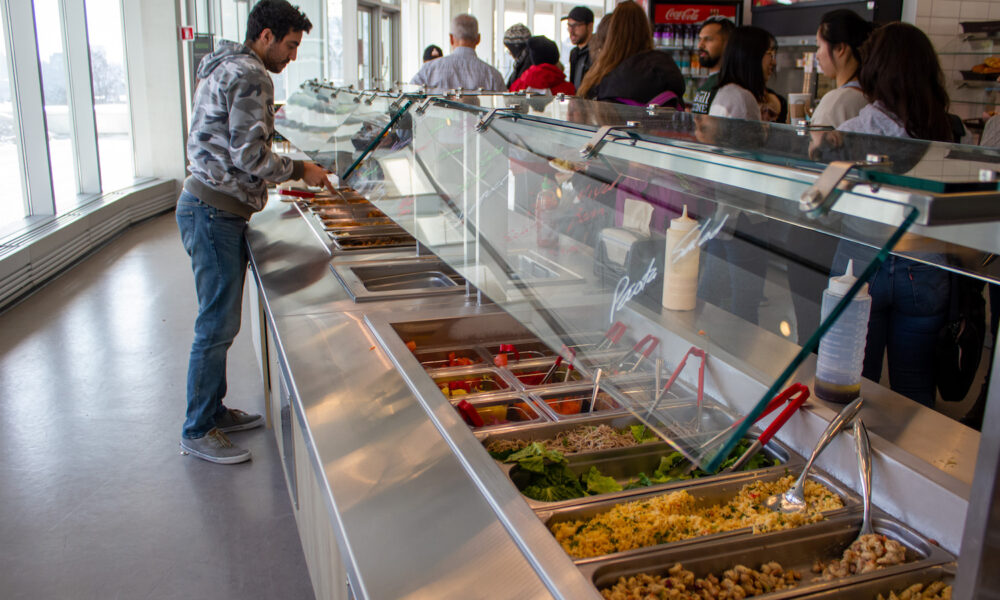CW: Discussion of disordered eating
Thanks in part to the rising costs of consumer goods driven by inflation, the price of McGill’s mandatory meal plan has increased by 35.5 per cent over the last five years.* Many students are feeling the financial squeeze when it comes time to purchase meals at on-campus dining locales and find McGill’s meal plan—which costs almost 90 per cent more than eight months’ worth of groceries—to be unaffordable. For some who spoke with The McGill Tribune, the lack of affordable options is manifesting as disordered eating, skipping meals, and a generally unhealthy diet.
McGill’s meal plan, which amounts to $6,200 per year including administration fees and $500 on oneCard, is compulsory for all first-year students living in residences, with the exception of those in Solin Hall. The fund is a declining balance plan that can be accessed for in-residence dining, flex dollars, and oneCard money at select locations. In 2017, this total was $4,575.
In an email to the Tribune, McGill media relations officer Frédérique Mazerolle noted that in order to keep up with the effects of rapid inflation, McGill’s food and dining services must operate the same way as any “retail operation.”
“McGill Food and Dining Services is a self-financing unit with the mandate to break even at the end of the fiscal year,” Mazerolle wrote. “In addition, it is a mixed model, which means that they run self-operated units as well as units managed by a food provider and as well, some of the retail locations are run by tenants.”
Although Mazerolle describes the meal plan as “budget-friendly,” not all students agree. In an interview with the Tribune, Grace Pacette, U1 Arts and current meal-plan user, expressed her dismay at the prices in McGill cafeterias.
“I am honestly so far very disappointed with the pricing,” Pacette said. “I have run the numbers with my friends a couple of times, and to eat three proper meals a day would put you between 30 to 45 dollars per day.”
She also expressed concern that, because the costs of nutritious foods are so high, students are forced to eat unhealthily in order to properly budget their meal-plan money.
“If I am looking at fresh fruit or something like that, I see a lot of the more nutrient-dense foods are more expensive,” Pacette said.
In an interview with the Tribune, Lily Silverman, U1 Science, explained that she would simply rather skip lunch than pay the campus cafeteria fees.
“Since I kind of live far away […] it is nice to have the cafeteria option, but it is rather expensive,” Silverman said. “A lot of times, I will just eat breakfast, and then I will not eat lunch and I will just go home and cook dinner.”
Pacette, too, has witnessed students skipping meals in order to stretch their meal-plan money to the end of the school year.
“I will hear a lot of people within a day talking about which meal they have skipped,” Pacette said. “It is creating a lot of disordered and problematic eating habits for people because they are trying to be frugal and ration their money. That is very concerning to me, personally.”
Pacette believes McGill ought to take action by cancelling the mandatory meal plan and lowering prices to help its students navigate the rising cost of living.
“I don’t think [the meal plan] should be mandatory,” Pacette said. “But I also definitely […] would hope that the university would try to take action to bring those prices down to make food a little bit more accessible to everyone.”
*This figure was calculated by The McGill Tribune using data collected from McGill’s Food and Dining Services’ website.








Pingback: A price freeze won’t fix inflation - The McGill Tribune
Pingback: SSMU executive midterm reviews - The McGill Tribune
Pingback: McLennan-Redpath closure: Construction or destruction? - The McGill Tribune